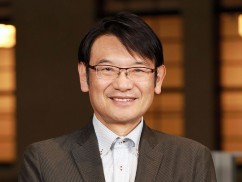- Page d'accueil
- >Nos évènements
- >Événements du Granem
- >Évènements 2025
- >Grand séminaire de Yukihiko Funaki
Grand séminaire de Yukihiko Funaki
Du 12 septembre 2025 au 12 septembre 2025
Vendredi 12 septembre 2025
De 14h à 15h30, en salle du Conseil, Faculté de Droit, Économie, Gestion
Uniquement en présentiel
Présentation en anglais
A l'initiative de Florian Navarro, membre de l'axe 1 "Défis alimentaires, environnementaux et organisationnels", le Granem a le plaisir de recevoir pour son prochain grand séminaire
Pr. Yukihiko Funaki

Yukihiko Funaki est professeur à l'école de Sciences Politiques et d'Economie de l'Université de Waseda à Tokyo au Japon. C'est un chercheur prolifique dans le domaine de la théorie des jeux et de l'économie expérimentale avec plus de 50 publications dans des revues de premier plans. Il est co-éditeur des journaux Mathematical Social Sciences, Journal of Mathematical Economics et Experimental Economics.
- Titre de la présentation
The Core and the Equal Division Core in a Three-person Unstructured Bargaining Experiment: The Weakest Coalition is Ignored (Taro Shinoda, Yukihiko Funaki)
- Résumé
EN - Cooperative game theory addresses two problems: coalition formation and payoff distribution. We hypothesize that the existence of the core, which is a fundamental concept in cooperative game theory, affects coalition formation, and we examine this hypothesis through a laboratory experiment. In the experiment, three subjects in a group bargain with each other on both the coalition formation and the payoff distribution simultaneously. The bargaining protocol is unstructured, i.e., similar to a real bargaining situation. As a result, we obtain the following findings. First, the existence of a core strongly induces the formation of the grand coalition. Second, resulting allocations are frequently in the core when it exists and are at least in the equal division core, which is an extension of the core. Finally, resulting allocations that are outside of the equal division core mostly arise due to ignorance of domination via coalition BC, which is the lowest-value two-person coalition.
FR - L'article présenté porte sur la coopération et la formation de coalition dans le cadre d'échange libre et non structuré. Elle démontre en quoi le concept théorique du cœur issue de la théorie des jeux coopératifs s'avère être un élément central dans l'émergence spontanée de la coopération.
C'est donc un résultat qui potentiellement intéresse tout scientifique travaillant sur des sujets dans lesquels les questions de coopération et de négociation sont présentes.


